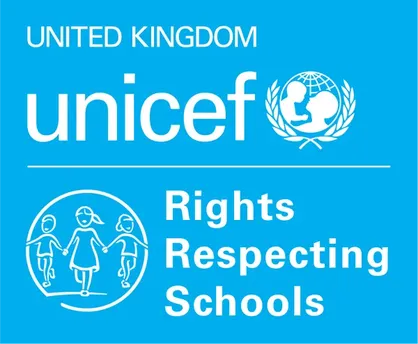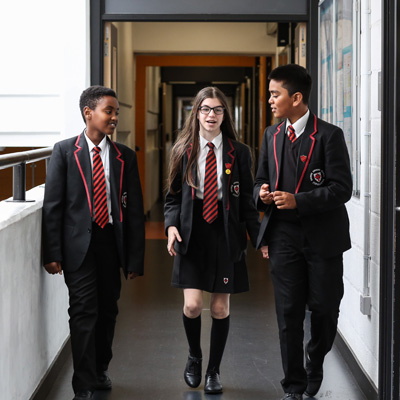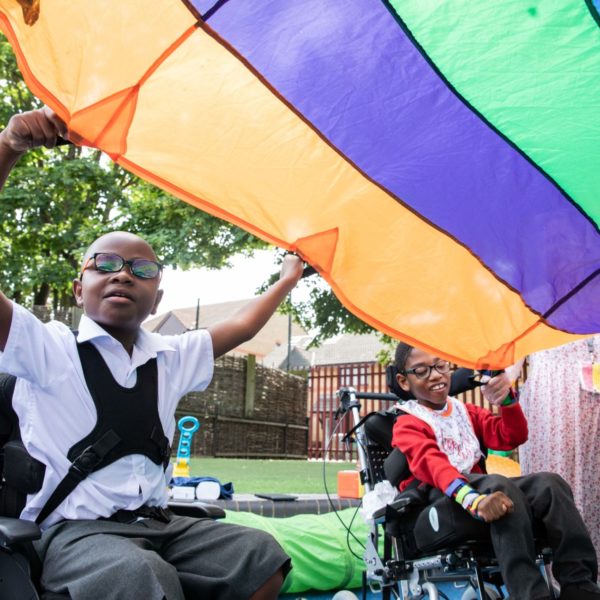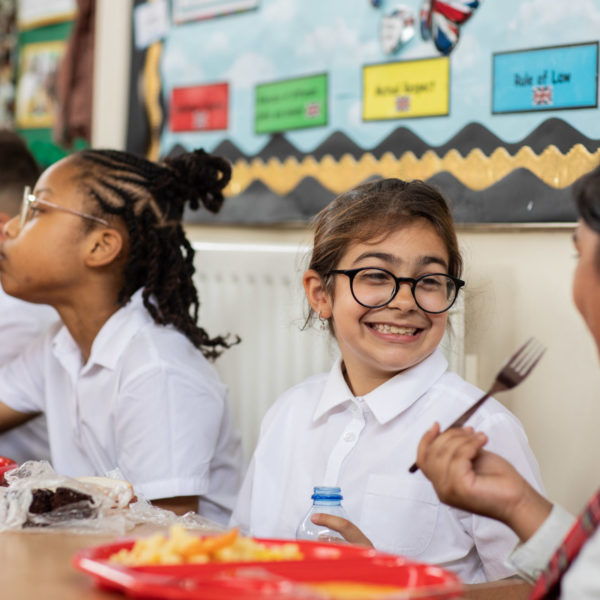James Brindley is a multi-site hospital school in Birmingham, providing education to young people with a range of complex health and emotional needs.
The school has been working with the UK Committee for UNICEF (UNICEF UK) since 2017 and achieved Silver: Rights Aware in 2018 before reaching Gold: Rights Respecting in 2021.
Headteacher, Hardip Bissell and RRSA Lead, Juliet Taylor speak about the work they have done to embed children’s rights in school life and the impact it has made.
Why did you become involved with UNICEF UK Rights Respecting Schools?
Hardip: We started our journey because we genuinely believe Rights Respecting fit with our ethos. It fits with our vision – Think Differently. We also really wanted to break the glass ceiling around children with Special Educational Needs (SEN) and academic achievement.
When I first started at James Brindley young people would often have negative connotations with school. There is this perception that going to a special school is somehow a step down and as a leadership team we want to challenge that narrative. There is no reason that young people at James Brindley cannot achieve academically and also thrive and develop.
Our job is to engage pupils in their education, develop their self-esteem and help them see themselves as being part of society. We want them to be able to advocate for themselves and other young people.
Then we looked at what the drivers are that might allow that to happen, the UNICEF UK Rights Respecting Schools Award helped young people to understand they have rights to certain things.
Pupils with SEN do not always know what their rights are, and wider society are either naïve or can take advantage of that. We want our young people to have the confidence to go into society and push their agenda.
We started our journey because we genuinely believe Rights Respecting fit with our ethos [...] We also really wanted to break the glass ceiling around children with Special Educational Needs (SEN) and academic achievement.
What has been the impact of becoming a Gold: Rights Respecting School for James Brindley?
Juliet: Getting to Gold has brought us closer together as an 11-site school across a large city. Early on I realised that many of the things we do are Rights Respecting anyway but having a mission, with an underpinning ethos, has taken us to the next stage. We have redeveloped ourselves with a mission to ‘Think Differently’. The certificate and banner are brilliant, but the journey is the key part . That process of becoming Rights Respecting has had a big impact on our pupils.
For young people the impact of knowing their rights is that they feel resilient, and they are equipped to tackle difficult issues, such as standing up for others if they see anything that they deem to be bullying, or challenging poverty or ‘sad situations’ they know of by using poetry and/or finding their voice. It’s like an armour that becomes part of you, you are aware of your rights and other people’s rights; that knowledge filters into young people who are being kitted out to make a difference for themselves and others. There are so many topics which they can openly talk about now, with each other and with teachers – gender identity and mental health for example – that they would not have talked about before. There is an openness because they know they are accepted and are part of a school that believes in their rights and their personal identity; therefore they can be who they want to be.
Hardip: To achieve Gold you must do things thoroughly and interweave children’s rights through everything you do. The way I manage is based on Rights Respecting. The step from Silver to Gold has influenced policy and what policy does is make fundamental changes and leads us to a place where rights influence every aspect of our school.
Silver was great but moving towards Gold allowed us to take that next step for children leaving the school and having the ability to voice their experiences confidently. One young person from our autism centre told me they used their rights when they observed one pupil pushing another. And this pupil intervened as he was aware that everyone has a right to be safe. The power of that and the culture that creates in a school is a butterfly effect. Our young people will not walk away from bullying. And if we have more of that we will have a culture of respect for everybody.
The pride I saw in my staff is fantastic and one of the most telling things. Lots of awards become ‘tick boxes’ and an element of it becomes an audit trail and if that becomes the case then you will get staff that do not value it and that can create resentment. Since we have started on the UNICEF UK Award its influence has become wider and wider and we have had no negativity from staff and that tells me it is valued.
Getting to Gold has brought us closer together as an 11-site school across a large city. Early on I realised that many of the things we do are Rights Respecting anyway but having a mission, with an underpinning ethos, has taken us to the next stage.
What challenges have you faced in putting the Award in place in your school and how did you overcome them?
Juliet: One challenge was the size of our school. In my Bronze training session from UNICEF UK I sat at a table with several others and three were from ‘one form entry’ primary schools and I can remember thinking I was the only secondary and the only special school there. I thought, ‘If you have a one from entry primary, all under one roof, it will need a different approach compared to our 11-site, city-wide school.’
I went away realising that Rights Respecting would, and could, look different at James Brindley, there isn’t a ‘one size fits all’; rather it is all about the RRSA ‘outcomes’. After some thought we decided that we would start with PSHE and humanities, as those subjects have strong links with ‘rights’ and they run through the whole school. But as we did more, I realised how much we were doing already, and it became about bringing work together under a Rights Respecting banner. [This was our Bronze starting point, it is now literally ‘everywhere’, linked by our ‘Think Differently’ 5 mission aims and our 5 parts on our school’s pupil-designed Charter].
The second challenge was making RRSA work in our unique school setting. RRSA do not have a fixed model of how it looks, the programme is flexible. So, it was about making the links between our work and Rights Respecting that was appropriate for us. For example, we put a UNICEF UK champion in every centre who are the eyes and ears on the ground, they can effect change too and can share new resources, project ideas or best practice examples. We also made Rights Respecting simple and user friendly; to begin with we encouraged pupils to participate in displays and teachers make links within lessons.
Hardip: There have been two key challenges when I look back. For a school like ours, where we have so many different centres and where we cater for the different needs of pupils, having a consistent approach has been difficult but not impossible. We have a coordinator, Juliet, but because we are multicentre, we have been reliant on individuals in each centre. And the logistics of making sure lines of communication have been open has been a challenge, not an insurmountable one, but not one that single site schools would have.
The other challenge has been how ready our young people have been, or not been, to take on board the rights. All our young people have had some form of trauma, physical or mental, and you need to be able to overcome some of your circumstances before you can explore your situation. Once they have found themselves and are in a position to have a confidence boost, our Rights Respecting whole school charter is there for them to take on board and help them celebrate themselves as they become young adults.
Forget the Award and embrace the journey and if it is done well it should go into every corner of your school and every aspect should be influenced by rights. You will only get that if you have buy-in from trustees, families, and the whole school community.
What advice would you give to other schools working towards Gold?
Hardip: My advice would be that you have to have young people at the core of your decision making and I know that many schools do, but the key element is to really listen to the young people and their actual needs. Do not let it be tokenistic, listen to what they are saying and challenge their perceptions of themselves and use children’s rights to do that. When you get to a point that a child is telling you about their rights and giving you examples of how they have used it you know you are truly a Rights Respecting School.
I would also say forget the Award and embrace the journey and if it is done well it should go into every corner of your school and every aspect should be influenced by rights. You will only get that if you have buy-in from trustees, families, and the whole school community.
Juliet: Get a good team of people together, do not do it alone. As soon as we were a team the work felt stronger. Another piece of advice would be to share what work or projects you have done, and what has happened, – but not just in school, with the wider community. It’s not always possible, and it is hard work, but it could be in a newsletter, through social media, a film or an external project like the ‘George Floyd project‘ pupils here took part in. Find different ways to share.






